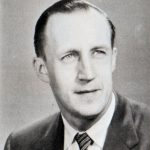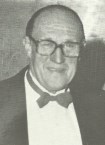Joseph Valentine Kopycinski, ‘Renaissance Man’
Legendary Lowell Sun newspaperman Charles G. Sampas called Joseph V. Kopycinski “tireless” in his work on behalf of his school and city, according to Archivist Tony Sampas of the UMass Lowell Libraries. Tony brought to our attention an impressive page on the UML website recognizing a “Renaissance Man,” one of the key figures in the reappraisal of Lowell’s place in history during the 1970s. We’re pleased to direct the spotlight on this community leader. UML Librarian Ellen Keane designed the link to the rare books in the Kopycinski Collection. Library assistant Zachary Narjarian Najafi worked with Tony to design the new LibGuide. Based on Tony’s research we learned that Joseph grew up on Branch Street in the Highlands neighborhood, one of five children of immigrant parents. His mother was from Lithuania. His father, also Joseph, was a carpenter and painter in the city during the Great Depression of the 1930s.—PM
Joseph V. Kopycinski, 1967, Lowell Technological Institute yearbook
From the UML web page: “Joseph Valentine Kopycinski (1923-1987) served as Lowell Technological Institute Librarian through the 1950s and 1960s, culminating with the position of “University Librarian” as LTI and Lowell State Teachers College merged in 1975. Kopycinski grew up in Lowell and following his graduation from Lowell High served with the U.S. Army 334th Infantry Regiment, 84th Infantry Division in the European theater during World War II. He earned his BS in Textile Chemistry from LTI in 1948, followed by an MS in 1950, and attained a Masters in Library Science from Simmons College in 1960. During his time at LTI and the University of Lowell he introduced the first equally funded women’s sports team, began, molded, and coached the varsity bowling program for twenty seasons (1965-1985), helped found the Athletic Hall of Fame, and was inducted into it posthumously. He also served as Secretary for the Alternate Bridge League at LTI and was Faculty Advisor to the Audio-Visual Society. The 1967 LTI yearbook, The Pickout, is dedicated to Kopycinski, and describes the man as “giving all his time and energy to all Lowell Tech students.”
“An avid student of Lowell and Middlesex County history, Kopycinski recognized the value that early Lowell mill records would have for scholars and oversaw LTI’s acquisition of the Locks and Canals Collection. These books and records proved to be the cornerstones of what would become UMass Lowell Libraries’ Special Collections, now located at Lowell National Historical Park’s Mogan Cultural Center. According to a 1961 Lowell Sun interview, Kopycinski cited the Locks and Canals Collection as representing “the most comprehensive record of life in early Lowell in existence.” In the Greater Lowell community, Kopycinski was a member of the Chelmsford Historical Commission and served on the board of directors of the Middlesex Canal Association. He also belonged to the Lowell Area Council on Interlibrary Networks and was a charter member of the Chelmsford-Westford Knights of Columbus. Meanwhile, almost as an alter ego, Kopycinski pursued his passion for Western Americana through his membership in the New York Posse of the Westerners society and by amassing a variegated collection of Western books. Lowell Sun news editor Charles G. Sampas came to write of him in an August 23, 1973, column, “Tireless is the word for Professor Joe Kopycinski.”
“The Joseph Valentine Kopycinski Collection, referred to as The JVK Rare Book Collection, is composed of over eight hundred volumes. The books include Greek and Roman classics, with strong holdings in American history and theology as well as rare editions of poetry ranging from Robert Burns to Robert Creeley. One of the highlights of the JVK Collection is a set of Hough’s fourteen volume “American Woods” (1903-1928). Housed in clasped slipcases, these books contain the exhaustive dendrological nomenclature of the day while the “pages” are composed of actual wood specimens of over 1,000 American trees, thinly sliced in transverse, radial, and tangential sections so that every page of each edition is a one of a kind. The Collection also includes Kopycinski’s American West Collection, yet to be cataloged.”

